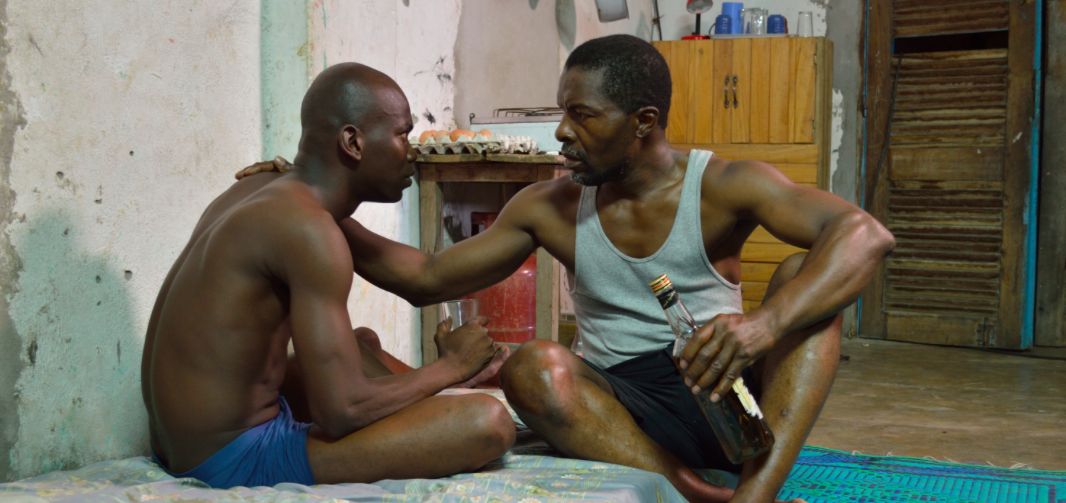
The film opens with an arresting first shot, pun intended – a man walks slowly down an aisle of looks to be a packed out church, with a gun in hand. We don’t see what he’s looking at, but the figure is staring intently, before raising the gun, uttering a prayer and shooting at an off screen target – only in the second scene are we told that the man killed is the Prime Minister. And so begins Run, a film from the Ivory Coast with a lot of pressure on its shoulders – the first film of director Philippe Lacôte, it’s also the first film from the African nation to ever be screened at Cannes (in the Un Certain Regard section) and it’s a film on the back of which the Ivory Coast hopes their film industry can recover, dormant after many years of the nation’s conflict – with the relatively mammoth budget of $2.1 million, including hefty state sponsorship. For an industry scraping for survival, it’s an assured, powerful film – vague in parts, but a powerful film about a man caught up in different sides of extremist political groups that have ravaged so many African nations, one that hopefully after a strong international reception finds an audience in its home nation.
The opening scene is an impressive set-up, and we then follow the titular Run as he hides from the military and retreats into his own memories and fantasies to go back to the forces that set the current series of events in motions. It’s a very convenient structure, and one which necessarily undercuts narrative tension as he goes through the perilous journey which got Run to this point, but it works on a thematic level – this is a portrait of a restless, lost youth who spends his life running from one mentor to another, adopting different philosophies and politics like trying on different coats and through chance becomes involved with an extreme, right-wing nationalist group waging wars on all foreigners in the Ivory Coast.
The first two wings of his development is his mentorship under a spiritual man, the closest he gets to a father figure, before his mentor is deemed to be killed by elders for reasons the young Run cannot comprehend, and then is taken on by an obese woman called Greedy Gladys. In a mostly humorous arc, Gladys was kicked out of her home and the army as neither could satisfy her vociferous appetite (and a corresponding libido, it is hinted at), and now takes to the road as a professional eater. It’s a strange narrative diversion, and the scenes of her eating gargantuan amounts of food and seducing Run feel like a subplot Fellini would have cut out of Satyricon for being too excessive, but in a coming-of-age tale it makes some sense. After Gladys is accused of ripping off locals when she can’t finish her meal, the consequent confusion leads to Run falling into a nascent political group under the leadership of The Admiral, an intimidating, corrupt but charismatic politician.
The scenes with these nationalists are quite revealing. There’s a visual paradox that Lacôte keenly observes – these rebels protesting about foreigners crossing borders sport American replica NBA jerseys and Beats headphones, and worship French luxury goods and clothing. There’s an irony here that Lacôte is interested in – US and France have oppressed and caused more harm to African nations like Ivory Coast and their inhabitants historically than any geographical neighbours many times over, and the hypocrisy in their xenophobia is something Lacôte relishes in pointing out. Exactly what the forces that drive them to these levels of hatred (seemingly beyond mere job shortages) is something that the film doesn’t extend to – Lacôte doesn’t presume to offer any hypotheses, which is understandable, but it means, like large parts of the film, this aspect is quite broadly sketched. And this ends up being the weakness of the film in many aspects in terms of plot machinations and character. Actor Abdoul Karim Konaté brings presence and clear ability to the role, but his character is so thinly drawn that it undermines some of his development. On one hand this is deliberate, in creating an Invisible Man-type figure as a generic youth to be crafted into whatever his current associates like, but there’s so little character that it means that the emotional aspects – his relationship with a woman in the group, his friendship with another soldier – don’t resonate.
Similarly the machinations of the politics are vague and nondescript. Early on the distance between Run on screen and the wider ramifications unfolding is extremely effective – the country descends into untold chaos as Run hides quietly; the power of the unseen adds to the paranoia and doubt creeping over Run. However, sometimes this feels inorganic; we’re told over voiceover later in the film who the Prime Minister is – an effective twist, but one that feels rushed and not supported by what we’ve seen on screen. However these issues in script are minor in comparison to the vision of the film – ultimately about one man’s ability to affect the course of a nation and the million of citizens through chance. A profound disconnect between the personal and the political, this film presupposes that many of the extreme political and cultural crises and changes in countries as vulnerable and with as many ethnographic and political tensions as the Ivory Coast are often at heart personal, often as simple as revenge, rivalries and egos, defying familiar (and often Western) narratives surrounding assassinations, revolutions and coups.
Overall it’s an impressive film – the relative inexperience of director Lacôte and actor Karim Konaté steadied by the presence of veteran Ivorian actor Isaach de Bankolé (regular in films by Jim Jarmusch and Claire Denis) as well as a with sense of energy and originality and imagination, Run shows signs of a director – and perhaps a nation – finding their voice.
